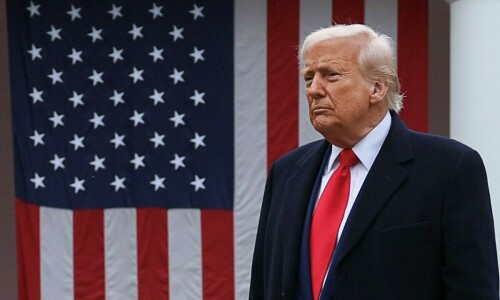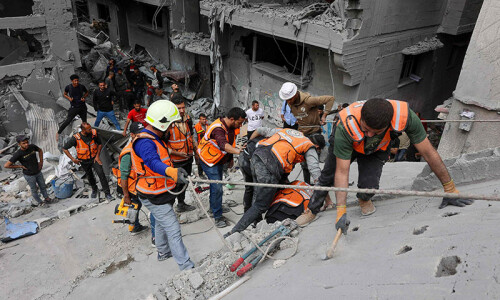As the Supreme Court’s newly formed constitutional bench began functioning on Thursday, it sought reports from all four provinces on actions taken to combat air pollution amid the prevailing smog situation.
The seven-member bench was formed last week under the 26th Amendment, with the Judicial Commission of Pakistan (JCP) appointing Justice Aminuddin Khan as its head by a majority vote of seven to five.
However, in view of the unavailability of the seventh judge, Justice Ayesha A Malik, a six-judge bench was constituted, with a case-fixing committee resolving to accord priority to the oldest cases.
Subsequently, a six-judge bench — comprising Justices Amin, Jamal Khan Mandokhail, Muhammad Ali Mazhar, Syed Hassan Azhar Rizvi, Musarrat Hilali and Naeem Akhtar Afghan — was set to take as many as 18 rights cases today.
As Punjab residents suffer from hazardous smog, with Lahore ranking highest on pollution charts today as well, the Lahore High Court has sought a long-term policy to control smog.
Today, the constitutional bench resumed hearing a 2007 case pertaining to environmental pollution in Islamabad — also its first on the issue.
The bench sought a report from all four provinces on measures they have taken to combat pollution and adjourned the hearing for three weeks.
The hearing
At the outset of the hearing, Justice Mazhar said the bench would review “all matters related to the environment”.
“Housing societies are being constructed at all places across the country,” Justice Hilali lamented.
The bench recalled that a letter was written to former chief justice of Pakistan Nasim Hasan Shah to declare Islamabad an industrial zone.
At this point, Justice Mandokhail highlighted: “Environmental pollution is not just Islamabad’s issue but the entire country’s.”
He noted that the smoke emitted by vehicles was a “major reason” for the pollution. “Are efforts being made to prevent smoke?” the judge asked.
Justice Afghan observed that farms were vanishing “because of housing societies”, and ordered that farmers be provided with protection.
“The nature has given us a fertile land but everyone is hellbent on destroying it,” he remarked. “What are you leaving behind for your future generations?”
Here, Justice Mandokhail, referring to the ongoing smog crisis in Punjab, said: “Look at Punjab’s situation. It’s visible to everyone.”
He further highlighted there were “similar conditions” in Islamabad as well a few days ago.
“Why is the Environmental Protection Agency not playing its role?” Justice Mazhar asked, noting that the matter had been ongoing since 1993 and “must be ended now”.
Justice Mandokhail stressed the entire country was facing a “serious environmental issue”. “Something is mixed in petrol that causes pollution,” he claimed.
Justice Hilali said there were poultry farms and marble factories at various points in Mansehra, noting that “a few beautiful locations in Swat have become victims of pollution too”.
Subsequently, the bench sought a report from each of the provinces on actions taken on environmental pollution.
It adjourned the hearing for three weeks at the request of the additional attorney general.
Petitions on environmental pollution
The constitutional bench resumed a 2007 hearing of a public petition against pollution caused by industrial units in Islamabad’s Sectors I-9 and I-10.
The petitions were filed by Nazir Ahmed and other residents of I-9 and I-10 about environmental degradation causing asthma, respiratory infections, allergies and heart ailments since the establishment of industrial units, especially steel furnaces and marble units, in the Federal Capital Industrial Estate.
In 1993, the Capital Development Authority (CDA) had developed a negative list of undesirable industrial plants working in the industrial estate. It encouraged them, especially the steel furnaces, to switch to some other trade and offered not to charge the normal fee.
According to earlier reports, 1,500 tonnes of effluents generated by the pharmaceutical industry, flour mills, oil and ghee mills, marble factories and plastic extrusion mills are thrown into the Leh nullah every day, heavily polluting underground water.
Around 500 factories in the I-9 and I-10 industrial estates were causing water and air pollution in the area, such as steel melting furnaces, re-rolling mills, flour mills, oil and ghee mills, marble cutting and polishing units, metalworking and engineering units, as well as GI pipes, soap, chemical, plastic, marble, spices and printing, a report had suggested.














































